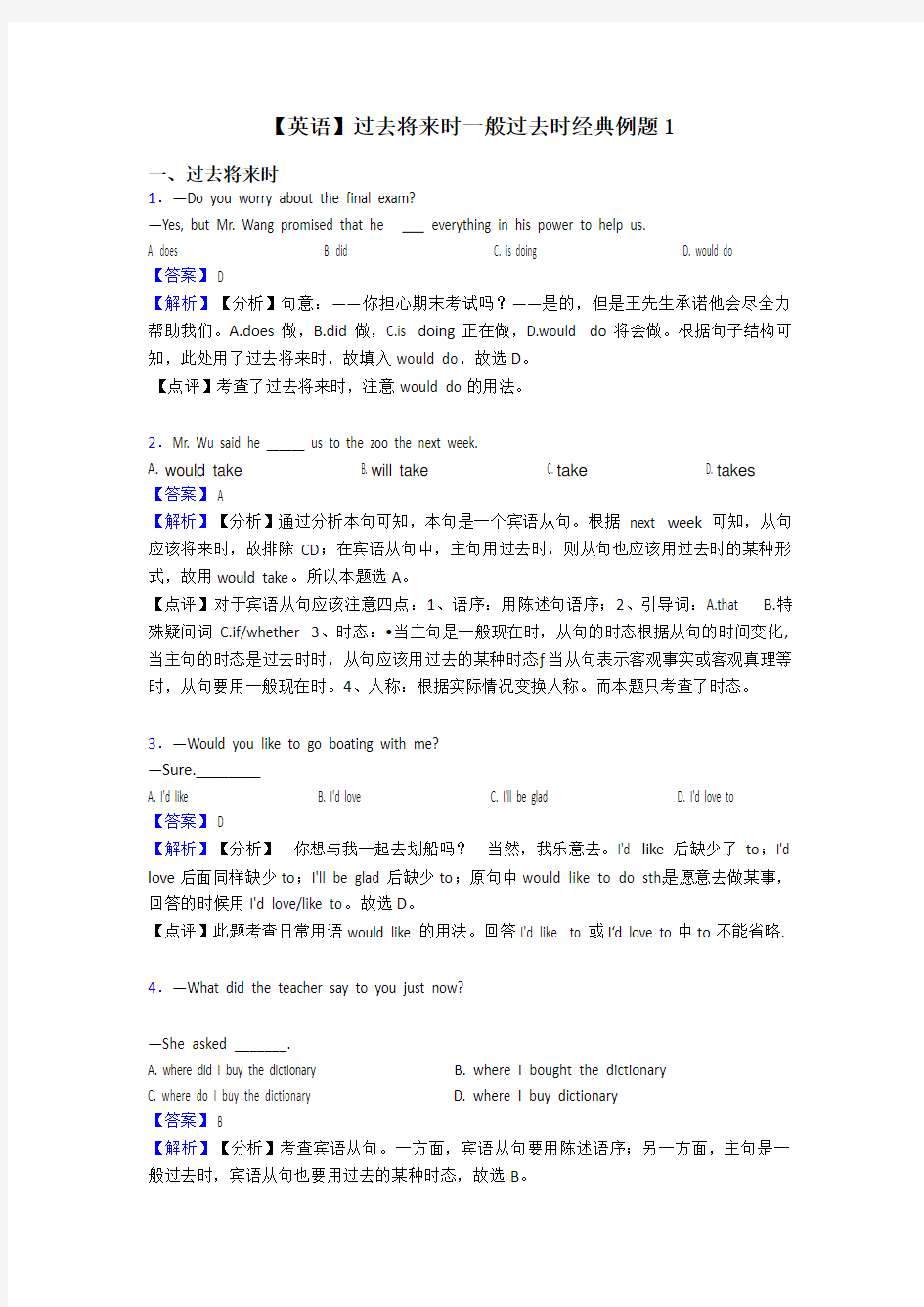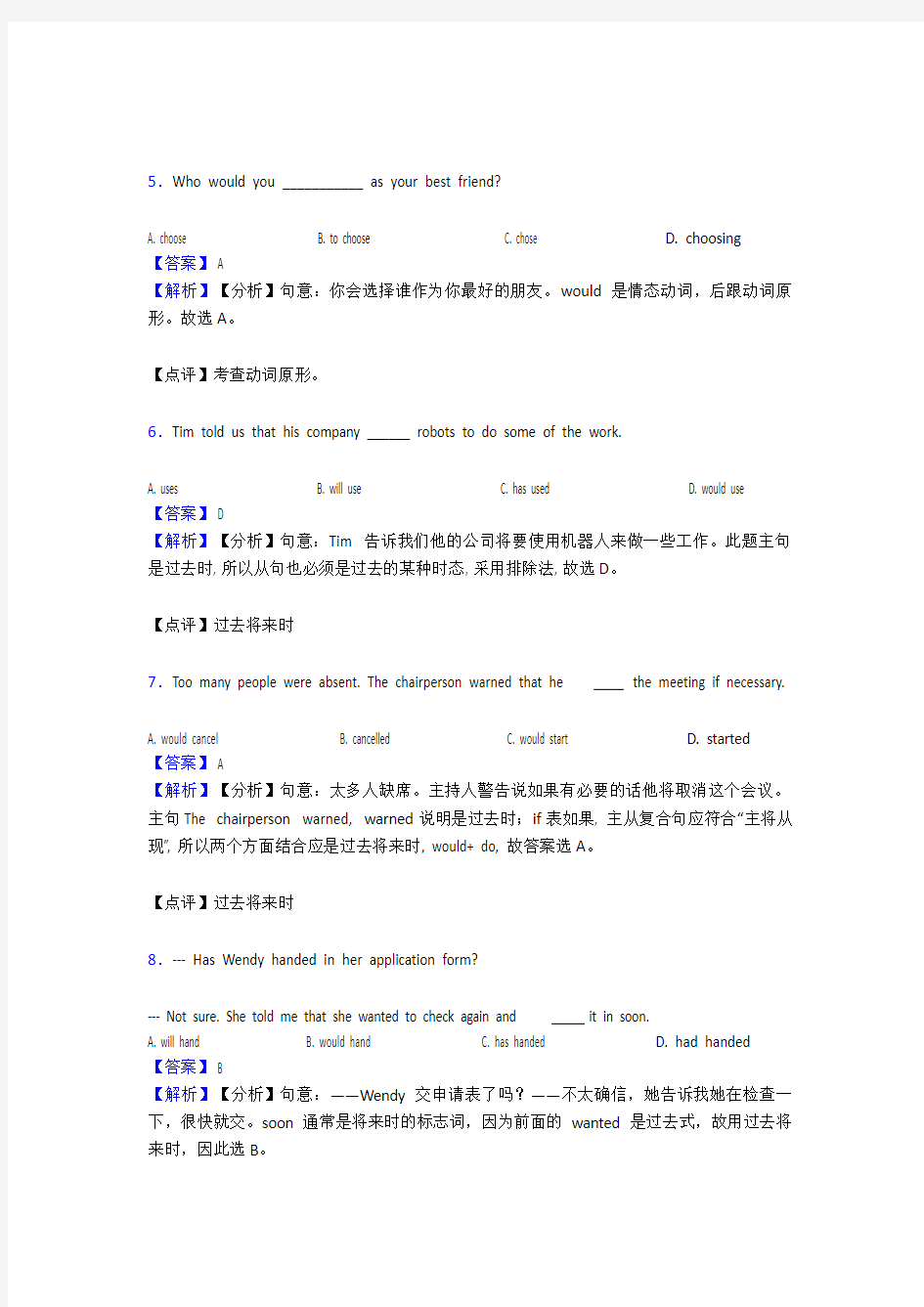【英语】过去将来时一般过去时经典例题1


【英语】过去将来时一般过去时经典例题1
一、过去将来时
1.—Do you worry about the final exam?
—Yes, but Mr. Wang promised that he everything in his power to help us.
A. does
B. did
C. is doing
D. would do
【答案】 D
【解析】【分析】句意:——你担心期末考试吗?——是的,但是王先生承诺他会尽全力帮助我们。A.does做,B.did做,C.is doing正在做,D.would do将会做。根据句子结构可知,此处用了过去将来时,故填入would do,故选D。
【点评】考查了过去将来时,注意would do的用法。
2.Mr. Wu said he ______ us to the zoo the next week.
A. would take
B. will take
C. take
D. takes
【答案】 A
【解析】【分析】通过分析本句可知,本句是一个宾语从句。根据next week可知,从句应该将来时,故排除CD;在宾语从句中,主句用过去时,则从句也应该用过去时的某种形式,故用would take。所以本题选A。
【点评】对于宾语从句应该注意四点:1、语序:用陈述句语序;2、引导词:A.that B.特殊疑问词C.if/whether 3、时态:?当主句是一般现在时,从句的时态根据从句的时间变化?当主句的时态是过去时时,从句应该用过去的某种时态?当从句表示客观事实或客观真理等时,从句要用一般现在时。4、人称:根据实际情况变换人称。而本题只考查了时态。
3.—Would you like to go boating with me?
—Sure.________
A. I'd like
B. I'd love
C. I'll be glad
D. I'd love to
【答案】 D
【解析】【分析】—你想与我一起去划船吗?—当然,我乐意去。I'd like后缺少了to;I'd love后面同样缺少to;I'll be glad 后缺少to;原句中would like to do sth.是愿意去做某事,回答的时候用I'd love/like to。故选D。
【点评】此题考查日常用语would like 的用法。回答I'd like to 或I‘d love to中to不能省略.
4.—What did the teacher say to you just now?
—She asked _______.
A. where did I buy the dictionary
B. where I bought the dictionary
C. where do I buy the dictionary
D. where I buy dictionary
【答案】 B
【解析】【分析】考查宾语从句。一方面,宾语从句要用陈述语序;另一方面,主句是一般过去时,宾语从句也要用过去的某种时态,故选B。
5.Who would you ___________ as your best friend?
A. choose
B. to choose
C. chose
D. choosing
【答案】 A
【解析】【分析】句意:你会选择谁作为你最好的朋友。would是情态动词,后跟动词原形。故选A。
【点评】考查动词原形。
6.Tim told us that his company ______ robots to do some of the work.
A. uses
B. will use
C. has used
D. would use
【答案】 D
【解析】【分析】句意:Tim 告诉我们他的公司将要使用机器人来做一些工作。此题主句是过去时, 所以从句也必须是过去的某种时态, 采用排除法, 故选D。
【点评】过去将来时
7.Too many people were absent. The chairperson warned that he the meeting if necessary.
A. would cancel
B. cancelled
C. would start
D. started
【答案】 A
【解析】【分析】句意:太多人缺席。主持人警告说如果有必要的话他将取消这个会议。主句The chairperson warned, warned说明是过去时;if表如果, 主从复合句应符合“主将从现”, 所以两个方面结合应是过去将来时, would+ do, 故答案选A。
【点评】过去将来时
8.--- Has Wendy handed in her application form?
--- Not sure. She told me that she wanted to check again and it in soon.
A. will hand
B. would hand
C. has handed
D. had handed
【答案】 B
【解析】【分析】句意:——Wendy交申请表了吗?——不太确信,她告诉我她在检查一下,很快就交。soon通常是将来时的标志词,因为前面的wanted是过去式,故用过去将来时,因此选B。
【点评】考查过去将来时。
9.— What time shall we leave for the airport?
— It's foggy today. I'm not sure be closed soon. Let's go now.
A. whether the highway will
B. whether will the highway
C. when the highway will
D. when will the highway
【答案】A
【解析】【分析】句意:――我们什么时间出发去机场?――今天多雾。我不确定高速公路是否很快要关闭。我们现在就走吧。be sure后跟的是宾语从句,宾语从句要用陈述句语序,B、D错;soon与when含义重复,C错。故选A。
【点评】考查宾语从句
10.— ________ you reading at this time yesterday?
— No, I was ________.
A. Were; singing
B. Are; watching TV
C. Were; dance
D. Are; having a rest 【答案】A
【解析】【分析】句意:昨天这个时候你在读书吗?不,我在唱歌。时态为一般过去时。故选A。
【点评】考查时态。
11.— What did the teacher say just now?
— Sorry. I didn't catch it. I ________ about something else.
A. think
B. will think
C. was thinking
D. thinks
【答案】C
【解析】【分析】句意:-老师刚才说什么了?
-对不起。我没赶上。我在想别的。表示过去正在进行的事用过去进行时。故选C。
【点评】考查时态。
12.The manager asked Tom if he ________ for the extra work the next weekend.
A. comes
B. will come
C. would come
D. had come
【答案】 C
【解析】【分析】句意:那个经理问汤姆下个周末是否会来加班。根据主句谓语动词asked 可知从句的时态是用过去的相关时态,根据时间状语the next weekend可知此处用过去将来时:would+动词原形,故答案为C。
【点评】考查宾语从句中的过去将来时。掌握从句的时态受主句的限制:当主句是过去时时,从句要用过去的某种时态。
13.Whenever we had trouble, he to help us.
A. comes
B. come
C. would come
D. will come
【答案】C
【解析】【分析】句意:每当我们遇到困难时,他总会给予帮助。When引导时间状语从句,从句用一般过去时,主句用过去将来时,would+动词原形,表示过去习惯性的动作。故选C。
【点评】考查would+动词原形表习惯性动作。
14.Sina said she ______ to school the next Sunday.
A. wouldn't go
B. isn't go
C. didn't go
D. won't go
【答案】 A
【解析】【分析】句意:希娜说她下周日不想去学校了.结合语境可知从句中描述的是站在过去角度看将来发生的动作,故用过去将来时态,选A.
【点评】英语中的时态主要是借助于时间状语与上下文语境来进行判断。解答此类题型,首先要注意句子中的时间状语,如果没有则要通过分析上下文,结合语境来判断句子的时态。英语疑问句中一般具有时态上的对应关系,注意结合这一特点进行区分。
15.When we lived in Hangzhou ten years ago, we for a walk after dinner.
A. go
B. would go
C. went
D. goes
【答案】B
【解析】【分析】句意:当十年前我们还住在杭州的时候,我们吃完晚饭会出去散步。When引导时间状语从句,从句用一般过去时,主句用过去将来时,would+动词原形,表示过去习惯性的动作。故选B。
【点评】考查would+动词原形表习惯性动作。
16.We were all surprised when he made it clear that he ________ office soon.
A. leaves
B. would leave
C. left
D. had left
【答案】 B
【解析】【分析】句意:当他表示他很快就会离职的时候我们都很惊讶。根据"made"和"soon"可知,此处表示过去将要发生的动作,应该用过去将来时,故选B。
【点评】考查时态,本题涉及过去将来时。
17.—Look at the sky. It ______ rain.
—Yes. The TV reporter said that it ____.
A. is having; had
B. may; will
C. will; could
D. is going to; would
【答案】 D
【解析】【分析】句意:——看天。要下雨了。——是的。电视预报员说会下雨。根据Look at the sky. 可知让看天气情况,说明要下雨了,句子用一般将来时,根据主从句时态保
持一致,根据The TV reporter said主句是过去时,可知从句用过去某一时态,所以此处是预报员说的会下雨,时态用过去将来时,故选D。
【点评】此题考查一般将来时和过去将来时。根据句意和语境确定句子时态。注意主句是过去时宾语从句的时态。
18.Mr. Wang said he ______ us ______ for another two weeks.
A. will allow; to work
B. will allow; work
C. would allow; to work
D. has allowed; work 【答案】 C
【解析】【分析】句意:王先生说他将允许我们再工作两周。根据句子结构可知,这是含有宾语从句的主从复合句,主句的谓语动词是said,是过去时,故从句也要用过去的某种时态;从句的时间状语是for another two weeks,又两周,所以从句是将来时,故用过去将来时,所以第一个空填would allow;另外第二个空allow sb. to do sth.允许某人做某事,固定短语,故选C。
【点评】此题考查宾语从句和固定短语。注意从句的时态和allow sb. to do sth.固定短语。
19.—What did your son say in the letter?
—He told me that he the Disney World the next day.
A. will visit
B. has visited
C. is going to visit
D. would visit
【答案】 D
【解析】【分析】句意:——你儿子在信中说了什么?——他告诉我他第二天要参观迪斯尼乐园。A.将参观,一般将来时;B.已经参观,现在完成时;C.将去参观,一般将来时;D.将去参观,过去将来时。the next day表明是将来时,told表明是过去时,所以用过去将来时,结构是would+动词原形,故选D。
【点评】考查过去将来时,注意平时识记would+动词原形。
20.Jerry told me he ___________ on an old man's eyes in the hospital this Sunday.
A. will operate
B. would operate
C. operated
D. has operated
【答案】 B
【解析】【分析】句意:杰瑞告诉我,这个星期天他要在医院给一个老人的眼睛做手术。operate做手术,实义动词。this Sunday表明时态是将来时,told是过去式,所以用过去将来时,结构是would+动词原形,所以用would operate,故选B。
【点评】考查过去将来时,注意平时识记其结构。
21.Albert Einstein was born in 1879. As a child, few people guessed that he a famous scientist whose theories would change the world.
A. has been
B. had been
C. was going to be
D. was
【答案】 C
【解析】【分析】句意:阿尔伯特爱因斯坦生于1879年。作为一个孩子的时候,很少有人猜到他会成为一个提出的理论能改变世界的科学家。横线部分表示过去将要发生的动作,
应用过去将来时,仅有C项 was going to be 为过去将来时。故正确答案为C。
【点评】考查动词的时态,本题涉及过去将来时的应用。
22.At college, Barack Obama didn't know that he the first black president of the United States of America.
A. was to become
B. becomes
C. is to become
D. became
【答案】 A
【解析】【分析】句意:在大学的时候,奥巴马不知道他将成为美国第一个黑人总统。用过去将来时表示过去某个时间将要发生的事情,所以选A。
【点评】考查动词时态,本题涉及过去将来时的应用。
23.James has just arrived, but I didn't know he until yesterday.
A. will come
B. was coming
C. had come
D. came
【答案】 B
【解析】【分析】本题考查的是过去进行时表示过去将来时的用法。当表示事先计划好的,安排好的要发生的事情,且谓语动词是一些表示位置变化的动词,如:leave, come等的时候,可以使用进行时表示将来时。句意:James已经到了,但是知道昨天我才知道他要来。根据句意可知他要来这里是计划好的事情,且动词come表示的是位置变化。故B 正确。
24.Our TV set sell well, but ten years ago no one could have imagined such a big share in the market that they______.
A. were to have
B. had had
C. were having
D. had
【答案】 A
【解析】【分析】句意:我们的电视卖的很好,但是十年之前没有人能够想像他们将会有这么大的市场份额。根据句意可知用过去将来时,A项中的were to have表过去将来,故答案为A。
【点评】考查时态。
25.The novel written by the author sells best, but five years ago no one could have imagined how great a role he in the literary world.
A. was playing
B. was to play
C. had played
D. played
【答案】B
【解析】【分析】句意:这位作者写的小说卖得最好,但五年前,没人能想象他在文学世界中将扮演的角色有多伟大。根据句意表示将来的动作,由时间状语five years ago可知是
过去的情况,故表示过去将来的情况,故选B。
【点评】考查时态,本题涉及过去将来时的应用。
26.Tony has just arrived here, but I didn't know he until yesterday.
A. would come
B. had come
C. came
D. will come
【答案】 A
【解析】【分析】句意:托尼已到了,但我直到昨天才知道他要来。分析句子可知,在昨天才知他要来,表示过去将来时,故选A
【点评】考查时态,本题涉及过去将来时的应用。
27.Mother promised she _____ me an English-Chinese dictionary.
A. is buying
B. will buy
C. would buy
D. has bought
【答案】 C
【解析】【分析】句意:妈妈答应给我买一本英汉词典。she _____ me an English-Chinese dictionary.是一个宾语从句,主句Mother promised使用了一般过去时,从句要使用相应的过去的时态,所以用过去将来时,故答案选C。
【点评】考查时态,本题涉及过去将来时。
28.Now we can't do without the Internet. But no one could imagine the part it _____ in our daily life 20 years ago.
A.was to play
B.had played
C.played
D.plays
【答案】A
【解析】【分析】句意:现在我们离不开互联网。但是20年前,没有人能够想象它在我们日常生活中所起的作用。根据时间状语20 years ago可知用过去时态,这里为从过去的观点看将来发生的动作或存在的状态,故用过去将来时。故选A。
【点评】考查时态,本题涉及过去将来时的应用。
29.The laptops made by our company sell best, but nobody could have guessed the place in the market that they ________ 20 years ago.
A. had had
B. had
C. were having
D. were to have
【答案】 D
【解析】【分析】句意:我们公司生产的笔记本电脑卖得最好,但是,二十年前,没有人能猜到它们在市场上的地位。表示过去将要发生的事情,用过去将来时,故选D。
【点评】考查时态,本题涉及过去将来时。
30.When we were boys we swimming every summer.
A. go
B. would go
C. went
D. goes
【答案】B
【解析】【分析】句意:小时候,每到夏天我们都要去游泳。When引导时间状语从句,从句用一般过去时,主句用过去将来时,would+动词原形,表示过去习惯性的动作。故选B。
【点评】考查would+动词原形表习惯性动作。
二、英语一般过去时
31.—Steven had nothing for breakfast this morning, ?
—No. Because he had a fever.
A. hadn't he
B. had he
C. didn't he
D. did he
【答案】 D
【解析】【分析】句意:——Steven今天早餐什么也没吃,是吗?——是的,因为他发烧了。这是一个反意疑问句,反意疑问句遵循“前否后肯”或“前肯后否”的原则,而且后半句的动词在时态,人称和数等方面必须和前半句的动词相呼应。当原句是一般过去时,根据句中的nothing可知陈述句部分是否定,相当一个否定句,后用简短的肯定的一般疑问句形式,即助动词+主语(人称代词),原句是一般过去时,助动词用did,所以反意疑问句用肯定did he,故答案选D。
【点评】考查反意疑问句。注意反意疑问句的用法。
32.In February, Chinese tech company Huawei ________ Mate X, a foldable (可折叠的) 5G mobile phone.
A. is introducing
B. introduced
C. introduces
D. was introduced
【答案】 B
【解析】【分析】句意:二月,中国科技公司华为介绍Mate X,一款可折叠5G手机。根据In February,可知陈述过去的事情,用一般过去时,谓语动词用过去式,introduce介绍,其过去式是introduced,故选B。
【点评】考查动词的时态,注意句子涉及一般过去时。
33.Everyone except Tom and John there when the meeting began.
A. are
B. is
C. were
D. was
【答案】 D
【解析】【分析】句意:当会议开始的时候,除了Tom和John没来,每个人都在这。except和besides两者都是“除去”之意,但前者指“但并不包括”,是“排除”之意,后者指“除此之外还有”,是“外加”之意。举例如下:There are six of us besides Tom.除汤姆外,另外还有6人。(一共7人)We all went home except Tom.除汤姆外,我们全回家了。(只有汤姆一人未回家)。谓语动词要看except前面的主语。故选D。
【点评】本题考查be动词。以及are、is、were、was四个词的用法和区别。34.—Sorry, I your dictionary yesterday.
—It doesn't matter.
A. took; by hand
B. took; by mistake
C. got; by accident
D. brought; in this way
【答案】 B
【解析】【分析】句意:——抱歉,昨天我由于差错拿走了你的字典。——没关系。yesterday昨天,和一般过去时连用,take:带走,bring:带来,get:得到,by mistake:由于差错,by hand:手工,in this way:以这种方式,根据句意可知答案,故选B。
【点评】考查动词的时态,辨析和短语。根据语境判断句意,选出恰当的选项。35.John ________ his grandma every day when she was in hospital.
A. visited
B. was visiting
C. visits
D. is visiting
【答案】 A
【解析】【点评】句意:奶奶住院时,约翰每天去看她。奶奶住院是过去的状态,在这期间发生的约翰每天看望奶奶的动作指的是过去经常反复发生的动作,用一般过去时态,动词用过去式。故选A。
36.—Have you ever climbed Mount Tai, Carol?
—Yes. I ______ in Taian for a week last year and reached the top of it twice.
A. had stayed
B. stay
C. stayed
D. have stayed
【答案】C
【解析】【分析】句意:--卡罗,你曾经爬过泰山吗?--是的,我去年在泰安呆了一周,并且两次到达山顶。last year,去年,过去的时间,又and连接的是两个并列的动作,所以应该用一般过去时态的。had stayed,过去完成时态;stay,一般现在时;stayed一般过去时;have stayed,现在完成时,结合句意,故选C。
【点评】考查时态辨析,last+时间是一般过去时的标志词之一。
37.My mind wasn't on what he was saying so I'm afraid I ____________ half of it.
A. missed
B. was missing
C. will miss
D. would miss
【答案】A
【解析】【分析】句意:本题翻译为:我的心思不在他刚才所说的内容上,所以我担心我刚才错过了一半的内容。A. missed一般过去时;B. was missing过去进行时C. will miss一般将来时;D. would miss过去将来时。根据句意,可知表示过去错过了一半的内容,所以用一般过去时,故选A。
【点评】此题考查一般过去时的用法。
38.—Sorry, Tom. I can't find the book you ______ me.
—It's OK. I don't need it any more.
A. lend
B. have lent
C. will lend
D. lent
【答案】D
【解析】【分析】句意:——对不起,汤姆。我找不到你借给我的那本书。——没关系。我不再需要它了。根据I don't need it any more可知汤姆现在不再需要那本书,因此借给我那本书应发生在过去,故此处用一般过去时,故选D。
【点评】此题考查一般过去时的用法。
39.He_________ me his name, but I can't remember it now.
A. tells
B. will tell
C. told
D. is telling
【答案】 C
【解析】【分析】句意:他告诉我他的名字,但我现在记不起来了。根据下文but I can't remember it now.可知以前告诉过我,要用一般过去时,tell的过去式told,故选C。
【点评】考查一般过去时的构成和用法。根据语境确定的动词的时态。
40.Mr Zhang and his wife _______to the party last Sunday。()
A. invited
B. was invited
C. were invited
【答案】 C
【解析】【分析】句意:上周星期天请的张先生和妻子参加晚会。表示上周星期天发生的过去动作,用一般过去时态;主语Mr Zhang and his wife是谓语动词invite的承受者,用被动语态,主语Mr Zhang and his wife表示复数合义。故选C。
41.— The hen ___________ three eggs yesterday.
— It's amazing.
A. lie
B. lay
C. lain
D. laid
【答案】D
【解析】【分析】——昨天那个母鸡下了三个蛋。——真令人惊奇。下蛋:lay eggs, yesterday是昨天的意思,和一般过去时连用,lay的过去式是laid, lie: 躺,撒谎,lay:lie 的过去式,或放,下蛋,lain是lie的过去分词,故选D。
【点评】考查动词辨析。熟记这几个词的区别和意义。
42.Jake _____his key in the office so he had to wait until his wife _______ home.
A. has forgotten … comes
B. forgot… come
C. had left… came
D. had left…would come
【答案】 C
【解析】【分析】句意:杰克把他的钥匙丢在办公室了,因此他不得不等到他的妻子回家。结合语境可知前文描述的是过去某时前已经完成的动作,故用过去完成时态。下文指的是过去某时的动作,故用一般过去时态。选C。
【点评】英语中的时态主要是借助于时间状语与上下文语境来进行判断。解答此类题型,首先要注意句子中的时间状语,如果没有则要通过分析上下文,结合语境来判断句子的时态。
43.– When did you _________ into this new house?
— Well, I _________ here for a month.
A. move, live
B. moved, lived
C. moved, have lived
D. move, have lived
【答案】 D
【解析】【分析】句意:—你什么时候搬到这个新房子的?—好的,我已经在这住了一个月了。根据上文是对一般过去的提问,可知用一般过去时态,根据语境下文应该用现在完成时来回答。根据题意故选D。
44.-- What's your hobby?
-- I listen to music, but now I enjoy dancing.
A. am used to
B. use to
C. am used
D. used to
【答案】 D
【解析】【分析】句意:——你的爱好是什么? ——我过去常常听音乐, 但是现在我喜欢跳舞。根据后半句中的but now(但是现在), 可知前半句说的是过去的动作.be used to表示习惯于, 后接doing;be used to do sth表示被用来做某事;被动语态;used to do sth表示过去常常.故选D。
【点评】一般过去时
45.—The bread is really delicious.
—Thank you, I ________ it myself.
A. make
B. made
C. will make
D. am making
【答案】B
【解析】【分析】句意:—面包真的很好吃。—谢谢,我自己做的。根据句意“面包美味可口”得知面包已做好,则说自己做的应为过去的动作,因此应使用一般过去时态。故答案选B。
【点评】考查动词时态的辨析。注意根据语境判断出动作是什么时候发生的从而确定时态。
46.—My car ________ yesterday. Could you please give me a ride tomorrow?
—I'm sorry I can't, I'm ________ Dalian tomorrow morning.
A. breaks down; flying at
B. has broken down; flying at
C. broke down; flying to
D. had broken down; flying to
【答案】 C
【解析】【分析】句意:——我的车坏了,你明天能搭我一程吗?——对不起我不能,我明天早上要坐飞机去大连。break down,出毛病,出故障,根据yesterday,可知用一般过去时,break的过去式是broke,根据tomorrow morning,可知用一般将来时,一些表示移动的动词可以用be+doing,表将来时,故选C。
【点评】考查动词的时态。注意根据时间状语确定动词时态。
47.—Great changes have taken place in our hometown over the past years.
—Yeah. Things ______different when we were young.
A. have been
B. are
C. will be
D. were
【答案】D
【解析】【分析】句意:——在过去的几年里,我们家乡发生了巨大的变化。——是的。我们年轻时情况不同。根据后文when we were young可知,本句时态为一般过去时,用were。故选D。
【点评】考查一般过去时,注意根据时间状语或其他动词的时态,判断考查的时态。
48.—_____ you _____ your homework yet?
—Yes, I _____ it ten minutes ago.
A. Did; do; finished
B. Have; done; have finished
C. Have; done; finished
D. Will; do; finish
【答案】 C
【解析】【分析】句意:---你完成作业了吗?---是的,我十分钟前完成了。yet是现在完成时的标志,所以第一句用现在完成时;ago是一般过去时的标志,所以第二空用过去式,故答案为C。
【点评】考查动词的时态,理解句意,根据关键词yet和ago判断时态。
49.—Where is Mr. Smith?
—He _______ to the library. I _______ him there five minutes ago.
A. has been; have met
B. has been; met
C. has gone; have met
D. has gone; met 【答案】D
【解析】【分析】句意:---史密斯先生在哪儿?---他去图书馆了,五分钟前我在那里遇到他。have been to去过某地(已经回来);have gone to去了某地(尚未返回)。根据句意可知史密斯先生此刻不在此处,所以用has gone;根据five minutes ago是过去时间可知第二空用一般过去时,故答案为D。
【点评】考查动词的时态,熟记have been to与have gone to的意思差异,注意判断时态的时间状语。
50.—Hi, Jack. Nice to meet you here in Taizhou! —Me too. But I _______ you were in Shanghai.
A. think
B. thought
C. am thinking
D. will think
【答案】 B
【解析】【分析】句意:一你好,杰克,很高兴在泰州这儿见到你。一我也是。但是我以为你在上海。A.一般现在时态;B.一般过去时态;C.现在进行时态;D.一般将来时态。在我见到你之前以为你在上海,表示过去的状态,用一般过去时,故选B。
